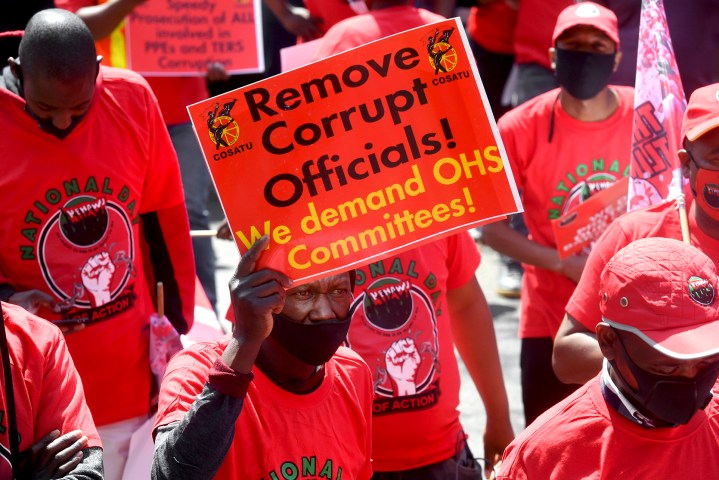OP-ED
The ANC years: Democracy suffers when there’s a disconnect between the head and the body

For the first time in South Africa’s democratic history, the number of registered voters who did not cast their ballot exceeded those who did. The performance of the ANC in government played a major role in this disenchantment.
In almost every sphere, whether in municipalities, provincial governments or national departments (barring some exceptions), ANC rule since the early 2000s has been accompanied by institutional turmoil. The deteriorating quality of public service is more and more an existential question for the ruling party. As people exit the formal political arena, it has become a challenge to democracy as well.
Why has the ANC got it so wrong? Cadre deployment and the politicisation of government administrations are a key part of the explanation. However disastrous cadre deployment has turned out to be, its initial attractiveness to the ANC lay in the promise it held to resolve a deep tension in South Africa’s democracy.
Democracy is a political system with a head and a body. Democratic contestation both within and without constitutional structures is about giving this head life, with colour and physical attributes, with attitude and with a voice. Political analysis of South Africa and of democracy is largely preoccupied with this great drama, focusing on the struggles (and disappointments) of forming the people’s will (betrayed by politicians beholden to factional interests, subverted by economic elites and so on).
Democracy, however, also has a body. The body of democracy is the government, whose task it is to implement the people’s will. Giving democracy a body requires building and resourcing all kinds of institutions.
What happens when the head doesn’t trust the body to follow its commands? Or inversely when the body develops its own mind and second-guesses the head? Since coming into power, the ANC has been sceptical of the preparedness of government bodies to implement its decisions. This was understandable in the 1990s when the civil service was largely staffed by former apartheid-era officials. After nearly 30 years of rule, however, politicisation has become the royal road to patronage.
In South Africa, the challenge of building an autonomous civil service is shaped by the specific characteristics of the transition to democracy in the country. The bureaucracy built by the apartheid governments was partially maintained by the ANC-led governments, which took on the challenge of transforming it gradually.
This strategy was adopted because of the political pacts, the so-called sunset clause, which gave rise to the transition and also because of the practical impossibility of radically reshaping the public sector workforce without disrupting the provision of basic public services. A relationship of distrust emerged in this context between the public service and ANC leaders, who were worried that that autonomy could be instrumentalised by factions of the civil service to resist the agendas of the new democratic regime.
The Ramaphosa government has mooted “depoliticising” the civil service as the lynchpin of its plan to reform the civil service. This is a very welcome move. Yet politicisation/depoliticisation is only one side of the problem.
Every democracy faces a dilemma regarding the limits of administrative autonomy. On the one hand, civil servants need to be professional and they should be appointed on the basis of merit. On the other hand, they need to be accountable to the elected, ruling party of the day. Meritocratic recruitment, however, reduces political control of the civil service. Too much administrative autonomy weakens the influence of the ruling party. Democracy is weakened when the bureaucracy acts as an independent force.
This is a dilemma without a solution. Indeed, trying to resolve it, as the ANC did after 1994, only creates additional problems. It must be managed.
Balancing these irreconcilable objectives is a task that requires constant organisational and political refinement. When this does not happen one of two scenarios tends to unfold in states with low institutional capacity:
- Patronage and clientelism, caused by the weakness of merit protection systems within the civil service; or
- Bureaucratic insulation, caused by the weakness of accountability mechanisms for public servants.
In a response to the government’s framework document on professionalising the public service, we propose that any reform initiative in South Africa must start from this dilemma. South Africa must have separate and independent bodies for:
- Ensuring meritocratic recruitment to the civil service on the one hand; and
- Ensuring that officials are accountable to their political masters. These institutions will necessarily be in tension.
Therein lies the limit of the human metaphor for the state. When the head and the body are in tension, we diagnose a condition. In the case of democracy, the head and the body are necessarily in tension. The challenge is to find the right balance between them. The future of democracy in South Africa depends on it. DM
Rafael Leite and Ivor Chipkin are the authors of The Paradox of Reform, a response to the South African government’s proposal to professionalise the public service. The paper is available here.


















 Become an Insider
Become an Insider
Comments - Please login in order to comment.